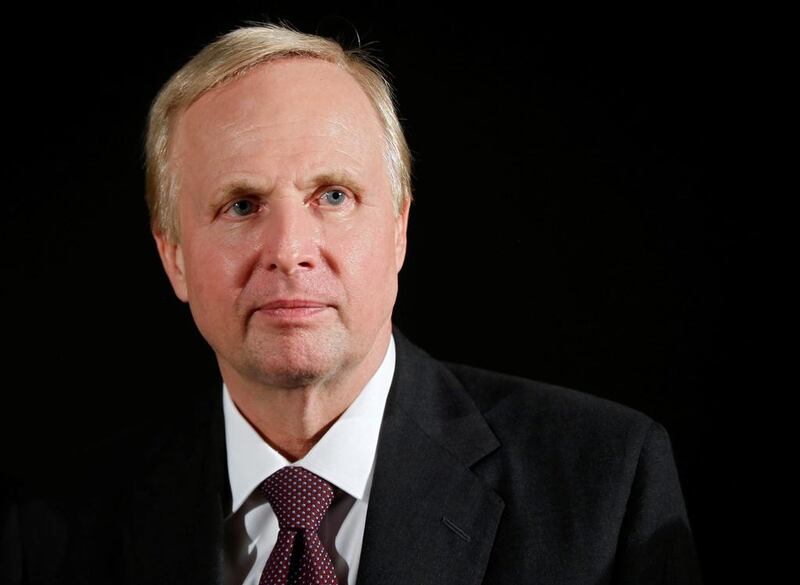BP has entered 2017 with a spring in its step and the bill for the Gulf of Mexico disaster finally settled. That spill, the biggest in the oil industry's history, cost it US$62 billion, paid for largely by flogging $40bn of precious assets built up over generations. At the same time, the company had to cope with the oil price rout, management shake-outs and the prospect of a takeover bid, which it would have had some difficulty fending off.
Yet here it is, still alive and doing deals once again. In the past month its chief executive, Bob Dudley, who has begun to assume semi-hero status among his investors, signed off 2016 with a flurry of activity. Early in December he gave the go-ahead for a $9bn investment into the Mad Dog 2 project in the Gulf of Mexico, followed by a $2.2bn deal to take a 10 per cent stake in Abu Dhabi’s oilfields; then came a $1bn investment in gasfields off north-west Africa with Kosmos Energy, and he ended the year with BP’s biggest downstream investment since 2001, the $1.3bn acquisition of 527 fuel stations in Australia.
For a company that has struggled to stay alive since that awful accident in 2010, this is quite a demonstration of strength, designed to show that BP is back on the international oil scene. Its share price, which sank to 310p back in February as oil slipped below $30 per barrel, ended the year above 500p and is being tipped by analysts as one of the stocks to watch in the coming year.
Amazingly, after all those asset sales and the pummelling of its share price, BP has emerged from the crisis with a market value of $125bn – a third the size of Exxon and half the size of Royal Dutch Shell, with which it once vied, but still a respectable enough figure.
It now remains to be seen just how badly it damaged itself with all those asset sales, which really represented a large chunk of its long-term project pipeline. Mr Dudley’s exploration strategy is based on lower-risk projects, getting more out of existing fields and growing the marketing business, which has always been one of BP’s core strengths.
Yet he has caused a good deal of comment – and some criticism – with his decision to opt out of developing Iran’s oil and gas reserves. Shell and Total, its biggest European rivals, have shown no such inhibitions. BP’s links with Iran go all the way back to 1908, when it started life as the Anglo-Persian Oil Company, and it was at the heart of the Abadan crisis in the early 1950s, when Iran nationalised its oil assets and expelled its managers. That caused the world’s first oil crisis and led to the reinstatement of the shah.
This time around, BP has made it clear that it is not tendering for any of the projects Iran is offering. That may be partly for commercial reasons.
“It’s a question of where the best returns on investment can be made and BP has plenty of attractive opportunities elsewhere,” said an analyst last week.
It has reopened its office in Tehran and bought some Iranian oil, but is moving very carefully. Although it is based in the UK, about 40 per cent of its shareholders are American and so are 30 per cent of its employees. Mr Dudley himself is an American citizen, barred from commercial activities with Iran under Washington’s sanctions, which are still in place despite US president Barack Obama’s nuclear deal, which Donald Trump has promised to reverse.
It is missing out on the biggest potential oil bonanza of the next decade at least. Iran sits on the second-biggest gas reserves and fourth-biggest oil reserves in the world, and is seeking $200bn of oil and gas investment over the next five years. The big Russian oil companies Rosneft (in which BP still has a 20 per cent stake), Gazprom and Lukoil are piling in, as are the Norwegians and Indians.
But not BP. Mr Dudley, like all the big American companies, may decide to wait until he sees what view Rex Tillerson, the former ExxonMobil chief executive nominated by Mr Trump as his secretary of state, takes on Iran (assuming he is approved by the senate, which is far from certain). Until then, the better part of valour is to stay clear.
In the meantime, he has made his point – BP is back and here to stay.
Ivan Fallon is a former business editor of The Sunday Times.
business@thenational.ae
Follow The National's Business section on Twitter





